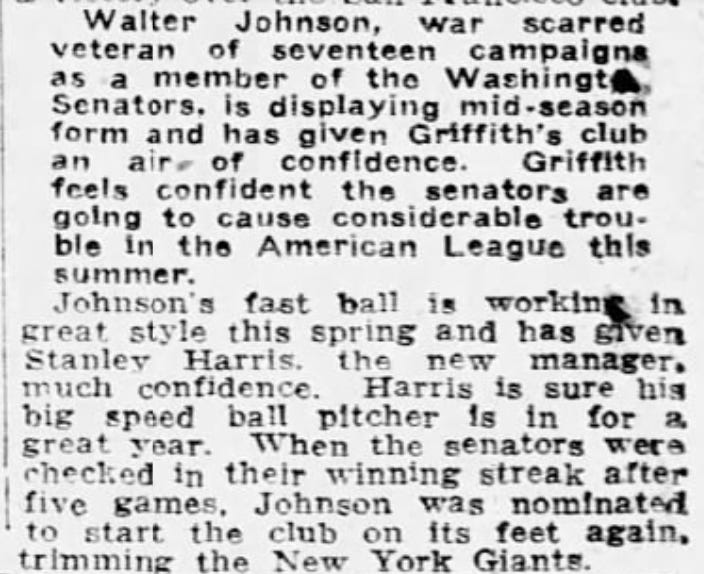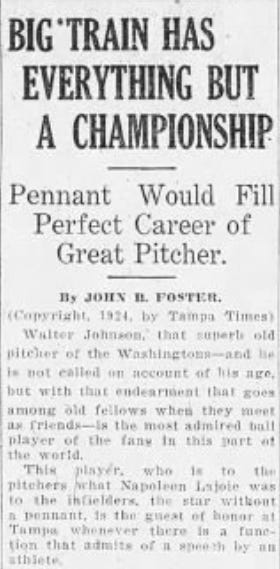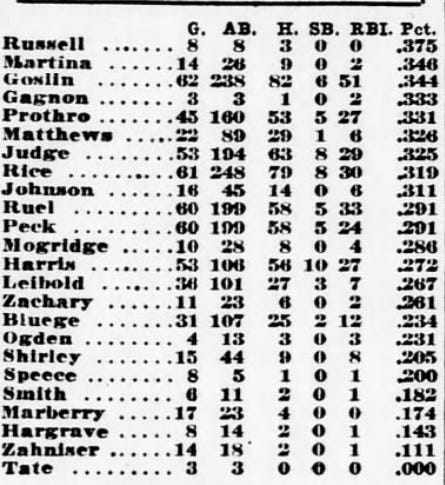The Sports Time Traveler™ has quietly been making daily trips since February, precisely 100 years back in time, to 1924, to follow Walter Johnson and the old Washington Senators (NOTE: their official name in 1924 was the Nationals, which was confusing because they played in the American League, and so most people called them by their old name prior to 1905 - the Senators).
Now, for the first time I am reporting to you about my travels to 1924 as there is big news to share.
WASHINGTON D.C. - June 27, 1924
Here in 1924, The Senators are blessed to have perhaps the greatest pitcher in American League history.
He is a man who is a beloved figure, not just here in the capital, but across America.
His name is Walter “The Big Train” Johnson.
Johnson debuted with the team late in 1907, at age 19, and has been with the team continuously ever since - now in his 18th season.
In his rookie year, he started 12 games and had a 1.88 ERA.
He only got better.
In his 2nd season he started 30 games and had an ERA of 1.65.
Then in his prime, in the decade of the 1910s, his statistics were phenomenal:
20+ wins every season with a high 36 in 1913
ERA under 2.00 every year except 1917 when he ballooned to 2.21
At least 6 shutouts each year except for 1916 when he only threw 3
At least 27 complete games every season
For the decade his record was 265 - 143.
Unfortunately for Walter, the rest of the team had a record of 490 - 594 in the 1910s.
The Senators have simply not been great during Johnson’s entire tenure.
At worst they were simply dreadful, losing 110 games in 1909.
At best they finished 2nd in the league in 1912 and 1913. But they were never truly in contention to win a pennant in either of those years.
In 1912 they finished 14 games back.
In 1913 they finished only 6.5 games back, but that was deceptive. They were 13 games back with 9 games to play and an 8 - 1 finish made it look like a closer race in the record books than it actually was.
In 1918 they finished 3rd, in a war shortened 128 game season that ended on September 2. But like 1913 they never really contended. With 10 games to go they were 6 games back and they were never higher than 3rd place all season.
All the other years of Johnson’s career the Senators were at least 17 games back at season’s end.
And at no time in Walter Johnson’s entire career were the Senators in first place during the summer.
The latest they had been in first place during Johnson’s first 17 seasons was 10 years ago, on June 8, 1914, nearly 2 weeks prior to the start of summer.
And through 1923, the Senators never saw first place again at any time since after the month of May.
The Senators were so awful year in year out that on April 30, 1921 the Washington Times Herald printed these infamous words about the hometown club:
“Washington, first in war, first in peace, last in the American League.”
It was a oft repeated joke that could be found in Washington newspapers going as far back as 1907.
The 1924 Season Outlook
Prior to the 1924 season the Senators prospects appeared dim as usual.
The American League was “owned” by Babe Ruth and the New York Yankees.
The Yanks had won the pennant in 1921 and 1922, and then last year, in 1923, playing in the brand new Yankee Stadium, they won the pennant a third straight time and upped their status American League Champions to World Series Champions by defeating the New York Giants 4 games to 2.
The Yankees dominated the American League last year. They finished 15 games ahead of the second place team in 1923.
The Yankees entered the season as the heavy favorites to win the pennant again in 1924.
The Big Train Considers Retirement
Meanwhile Walter Johnson of the lowly Senators, at age 36, was considering retiring.
Johnson had not been the same overpowering pitcher in the the early 1920s that he had been in the 1910s.
In 1920, injuries forced him to miss the 2nd half of the season.
In the 1921 - 1923 seasons he never won more than 17 games and never had an ERA below 2.99. He was good, but far off his marks from the prior decade.
Then the news came out during the off season that Johnson had signed a contract to play one more season in 1924.
It is generally expected that this year will be his last in the majors.
Across the country sportswriters have lamented that Walter Johnson will never get to pitch in the World Series.
On February 11, 1924 The New York Daily News wrote this about Johnson:
On March 1, 1924, The Pittsburgh Post included the piece below on Walter that demonstrates how much he is revered even in cities in which he has never pitched.
The article includes this passage about how Johnson will be thought of after he retires at the end of the season, “The National sport will lose one of its real drawing cards, also a man who has been a credit to the game.. Some day the history of Walter Johnson will be written. It should be written, and also read by every boy in the country… He never took a drink of intoxicating liquor in his life, never smoked or even chewed tobacco.”
Towards the end of March a story came out that Johnson was definitely going to retire after the 1924 season and it ran in newspapers throughout America.
The prevailing thought before the start of the season was that poor Walter would never pitch in a World Series as his 1924 Senators club appeared to have little to no chance to be competitive.
This wire service story below was a typical one from this past spring, and appeared in the Seattle Union Record on March 28, 1924.
Here are portions of the article of note, “Walter Johnson must have given up all dreams of pitching in a world’s series… the Washington Senators are not going to win any pennants… barring two or three of those miracles.”
Johnson Looked Great in Spring Training
Those who saw Johnson play in spring training in Tampa noted that he was looking better than he had in years.
The article below appeared in the Tampa Tribune on March 28, 1924, indicating Johnson appeared to be in “mid-season form.”
It also cited the usual wishful thinking of club owners dreaming about their team’s prospects for success in the upcoming campaign.
In addition, there was a note about the new manager of the Senators - Harris.
That’s Stanley “Bucky” Harris, who has been given the reins of the club at just age 27 to be the player-manager. He’s the youngest manager in baseball history to this point. Harris has been the team’s regular second baseman since 1920.
Yet another article on March 28, 1924, this one in the Tampa Times, attested further to the impact Walter Johnson has made on people’s hearts during his prior 17 years playing ball.
He is referred to in the article as, “the most admired ball player of the fans in this part of the world… the star without a pennant is the great honor at Tampa whenever there is a function that admits of a speech by an athlete.”
Play Ball - The 1924 Season Begins
Opening day of the 1924 season was on Tuesday, April 15th.
President Coolidge tossed out the first pitch at Griffith Stadium in Washington, D.C.
And Walter Johnson looked sensational.
He pitched a shutout.
But the victory was not followed by many others. The Senators finished the month of April at 5 - 8.
In May, the team played a game over .500 ball and finished the month with a record of 17 - 19.
Johnson started May looking very average. On May 14th he lasted just 4 innings in a loss at home to the Indians. His record stood at 4 - 3 and his ERA was at 2.90.
Then on May 23rd he shutout the White Sox on one hit while racking up 14 strikeouts.
It was a gem.
Louis A. Dougher of The Washington Times-Herald wrote, “In Florida Johnson gave every sign of being in better condition than in years, but in his starts before yesterday he had not lived up to those Florida promises. Yesterday, however, he was the great Walter Johnson of 1912 and 1913.”
The Big Train Ride Gets Bumpy
But Johnson’s great game on May 24th was followed up by a poor outing. He lasted only 2 innings at home against the Yankees in the rain on May 28th.
The Washington Herald noted, “The big train was not himself.”
And then he gave up 5 runs in 5 innings in Boston 2 days later.
Johnson finished the month of May a record of 5 - 3 and an ERA of 3.27.
In his next two outings he bounced back with complete game victories including a shutout of the Tigers on June 6th - his 3rd shutout of the year.
Revered Across America
Regardless of his performance in his 18th and likely final season, Johnson is receiving great adulations, day after day, in newspapers around the nation.
On June 4th, the Spokane Press wrote the wonderful article below about Walter Johnson.
On the other side of the continent he was praised as if he was the hometown hero as the paper wrote, “There was never a more popular idol than Johnson. Even partisan fans hate to see their favorite team beat him... every American league player has the greatest admiration for Walter Johnson.”
The Senators Continue to Meander
The Senators started the month of June losing 5 of 9 and their record dropped to 21 - 24 on June 10th.
Here were the standings in the American League on June 10th:
Yankees 25 - 18
Red Sox 25 - 18
Tigers 27 - 22
Browns 23 - 23
Senators 21 - 24
White Sox 20 - 23
Indians 19 - 24
A’s 18 - 26
It looked very much like a typical Senators season as they were mired in 5th place.
And Then Something Magical Begins
Quite inexplicably, on June 11, the Senators, who were in the middle of a 3 week road trip, started to win games more consistently.
That day they bombed the Browns, in St. Louis, 12 - 1.
23 year old Goose Goslin hit a home run in the 8th and drove in 3 runs for the Senators. Goslin, who led the American League in triples last year with 18, raised his batting average to .333.
The Senators won again the next day with Johnson getting another victory to raise his record to 8 - 3.
And they made it a sweep of the Browns a day later to reach .500 at 24 - 24.
The Senators lost close games in Chicago the next 2 days to drop their record back to 24 - 26.
Then, starting on Tuesday, June 17th they reeled off 5 consecutive wins.
Having won 8 out of 10 games, the Senators moved up to 3rd place 2 games behind the league leading Yankees at the end of the day on June 22nd.
Their next 4 games were scheduled to take place in the new Yankee Stadium, that opened last year, in 1923.
There was such excitement among baseball fans here in Washington that the Evening Star newspaper reported on Tuesday, June 25th that thousands of people, “kept calling the newspaper offices day and night asking for the result of the game,” in New York.
The Evening Star further reported about a throng of people that followed the score of the game as it was posted outside their building:
The Senators kept on winning and winning.
They swept the Yankees in New York.
As best as the Washington sportswriters could recall it was first time the Senators had ever taken 4 straight from the Yankees. It was also the first time the Yankees had lost 4 straight at the new Yankee Stadium.
The sweep of the Yankees vaulted the Washington Senators into first place in the American League.
It was the first time the Senators had ever been in first place during the summer in franchise history.
And now the Senators were finally coming home after 3 weeks on the road.
Yesterday, June 26th, was the homecoming day. An informal “baseball holiday” was declared in Washington D.C. as reported on the front page of today’s Washington Herald:
A record crowd, estimated at 30,000, came out to Griffith Stadium for a Thursday afternoon doubleheader against the A’s.
The Washington Times Herald reported that, “a buzz of excitement pervaded the ball park. Each man was there to do his bit to inspire the team to further clinch its hold on first place.”
The Senators players received a welcome akin to that of conquering armies of ancient civilizations. The Times Herald reported, “the heroes were ushered onto the field through a pathway of roses strewn by beautiful young women in Grecian costumes.”
President Coolidge decided to attend with his wife and 2 children. While his wife and kids made it in time to see the first game, the president, escorted by the secret service, was late and caught only the second game.
Walter Johnson pitched the first game.
It doesn’t get better than this.
The Game - Walter Johnson Faces the Philadelphia Athletics
In the top of the first, Johnson got leadoff batter Max Bishop to ground out to the manager, Bucky Harris, at 2nd base. Then Amos Strunk hit a short liner to left that Goose Goslin grabbed for out number 2.
The 3rd A’s batter, Paul Strand, stroked a deep line drive to left center that could not be caught. Centerfielder Wid Matthews throw to 3rd base was wild and if not for Johnson backing up 3rd baseman, Ossie Bluege, Strand would have had an inside-the-park home run.
Johnson then stranded Strand on 3rd base as he struck out A’s clean up hitter, Joe Hauser.
In the bottom of the first, Bucky Harris hit a 2 out double and scored moments later on a Goose Goslin triple.
SENATORS 1 A’s 0 - end of 1 inning
Johnson retired the side in order in the top of the 2nd and the top of the 3rd.
The Senators also went quietly in the 2nd and 3rd innings.
SENATORS 1 A’s 0 - end of 3 innings
In the top of the 4th, Johnson got the first 2 batters out. This ran his streak to 9 consecutive batters retired. Joe Hauser broke the string by hitting a ball to deep left center for a triple.
With 2 outs and a man on 3rd base, Johnson faced rookie Al Simmons. Simmons walked.
The next batter, Harry Riconda, hit a grounder to Senator’s shortstop Roger Peckinpaugh who got Simmons at 2nd base on the force out.
Johnson had gotten out of the inning.
The Senators went down in order in the bottom of 4th.
In the top of the 5th, Johnson gave up a single to A’s catcher Cy Perkins. With Perkins on 1st base and 1 out, Johnson got the A’s pitcher Stan Baumgartner to hit a little blooper right back to him. After catching the ball, Johnson whirled and threw to 1st baseman Joe Judge and they doubled up Perkins to retire the side.
The Senators went down quickly again in the bottom of the 5th.
SENATORS 1 A’s 0 - end of 5 innings
In the top of the 6th, Johnson faced the top of the A’s batting order. He walked Max Bishop. Then Amos Strunk hit a deep drive to right center field. Centerfielder Wid Matthews got to the ball for the out, and his throw held Bishop at 1st base.
Paul Strand hit a grounder to short and “Peck” flipped it to Bucky to force out Bishop at 2nd.
With 2 outs, lefty hitter Joe Hauser reached for an outside pitch from Johnson and slapped it to the opposite field for a single. Then Johnson got the rookie Simmons to fly out to the veteran right fielder Sam Rice to retire the A’s.
The 34 year old Sam Rice is in his 10th season, all with the Senators. Back in 1920 he led the American League with 63 steals.
In the bottom of the 6th, Matthews led off with a single and Bucky Harris reached base when he hit a roller to the pitcher Baumgartner and the throw to 1st base was wild. With nobody out and runners on 1st and 2nd, Harris called for Goose Goslin to bunt and move the runners over.
Now with runners on 2nd and 3rd and 1 out, hard hitting Joe Judge whacked a double to right field scoring Matthews and Harris. The Senators had broken the game open. The A’s got the next 2 batters out but the damage had been done.
And Bucky Harris looked like a shrewd strategist.
SENATORS 3 A’s 0 - end of 6 innings
The A’s looked like they were eager to get back in the game in the top of the 7th. Harry Riconda started off the inning with a single that ricocheted off the glove of 3rd baseman Ossie Bluege. Then A’s shortstop Chick Galloway hit a line drive straight up the middle. Johnson was able to knock it down, pick the ball up and fire to Peck covering 2nd base and they got Riconda.
After that Johnson got out of the inning easily as Perkins popped up to Peck and Baumgartner struck out.
The Senators went down in order in the bottom of the 7th.
In the top of the 8th, Johnson got Bishop to pop up to Peck. Strunk singled to centerfield. But they got Strunk out when Strand hit a grounder to Peck who threw to Harris covering 2nd. Harris then got the final out when Hauser hit a roller to Harris at 2nd.
In the bottom of the 8th Harris came up with 1 out and doubled to left field. Goslin walked, putting men on 1st and 2nd with 1 out.
Joe Judge then hit a single to left and Harris came home while Goslin stopped at 2nd.
So it again was men on 1st and 2nd and 1 out for the Senators.
The next batter was the catcher, Muddy Ruel. The 28 year old Ruel had played for the Yankees and the Red Sox and was now in his 2nd season behind the plate for the Senators.
Ruel singled to centerfield scoring Goslin, but Joe Judge was caught at 3rd base for the 2nd out. Then Peck fouled out to the catcher Perkins. But the Senators had scored 2 more runs and now had a commanding 5 run lead for Walter Johnson going into the final frame.
In the top of the 9th, the leadoff batter was rookie Al Simmons. He singled. Then Riconda singled.
The A’s had men on 1st and 2nd with no outs.
The next batter, shortstop Chick Galloway hit a line drive to left. It was a pivotal moment. Racing over came Goose Goslin and he made the catch.
With 1 out and 2 A’s on base, catcher Cy Perkins came up. He hit a grounder toward Bluege at 3rd base. Bluege made the play to 1st base to get the 2nd out, while both runners moved up.
Now there were A’s on 2nd and 3rd with 2 outs.
With the pitcher due up, A’s manager and owner, Connie Mack, brought in pinch hitter Sammy Hale.
In a fitting finale, Johnson struck out Hale to end the game and preserve his shutout.
It was the 105th shutout in the grand career of the Big Train.
SENATORS 5 A’s 0 - FINAL SCORE
The Big Train had delivered in one of the biggest games of his career to date.
It was the 10th straight victory for the Senators.
It was the first time Walter Johnson had ever pitched in Washington when his team was in first place during the summer.
And he had pitched a shutout in front of a packed house.
The President
Unfortunately, President Coolidge had not been there to see it.
The President did arrive in time to watch the second game.
He was “implored to exercise his throwing arm,” according to the Washington Herald. “He tossed out a brand-new ball that found its way into the rear pocket of Umpire Ormsby.”
The Herald described President Coolidge as looking, “cool as a cucumber in his light gray suit, with a white boutonniere in the left lapel, and wear a straight brim straw hat.”
Coolidge also had the effect of cooling off the hot Senators.
In the second game of the doubleheader, The A’s Eddie Rommel held the Senators to just 2 hits and he beat them 1 - 0 to end the streak.
The game lasted just 1 hour and 17 minutes.
The entire doubleheader, plus pre-game festivities, took all of four-and-a-half hours.
The loss and the end of the streak couldn’t spoil the Washington fans’ delirious state.
Francis Daily who wrote the front page article in today’s Washington Herald reported that manager Bucky Harris, “and his well oiled machine were accorded a continuous demonstration throughout the afternoon that was unsurpassed in the history of the game in Washington. It was a great afternoon.”
The results of the first game of the doubleheader were celebrated in the Washington News with a page 1 banner headline in the evening paper yesterday which went to press prior to the end of the 2nd game:
Here are the standings in the American League as of this morning, June 27th:
Senators 34 - 27
Tigers 35 - 30
Red Sox 31 - 27
Yankees 30 - 28
Browns 30 - 29
Indians 30 - 31
White Sox 29 - 31
A’s 22 - 38
And here are the current batting statistics for the first place Senators.
Among the regulars, Goose Goslin leads the team with 51 RBIs and a .344 average.
Walter Johnson now has a record of 10 - 3 with 4 shutouts and an ERA of 2.79.
And the Big Train is batting .311 as well.
After the game, Bill Price, writing in the evening edition of the Washington Herald on June 26, 1924 had this to say about the beloved “great old man,” Walter Johnson:
The Sports Time Traveler will continue making daily trips back precisely 100 years to see how long the old Washington Senators can hold onto first place.
Thanks for reading.


























Share this post